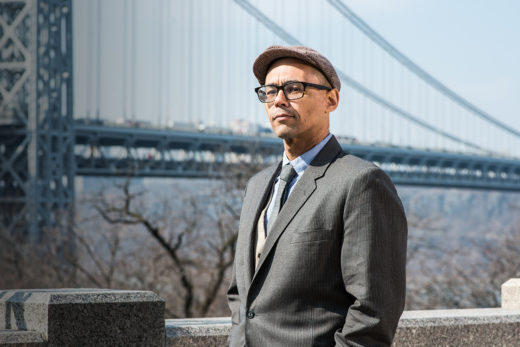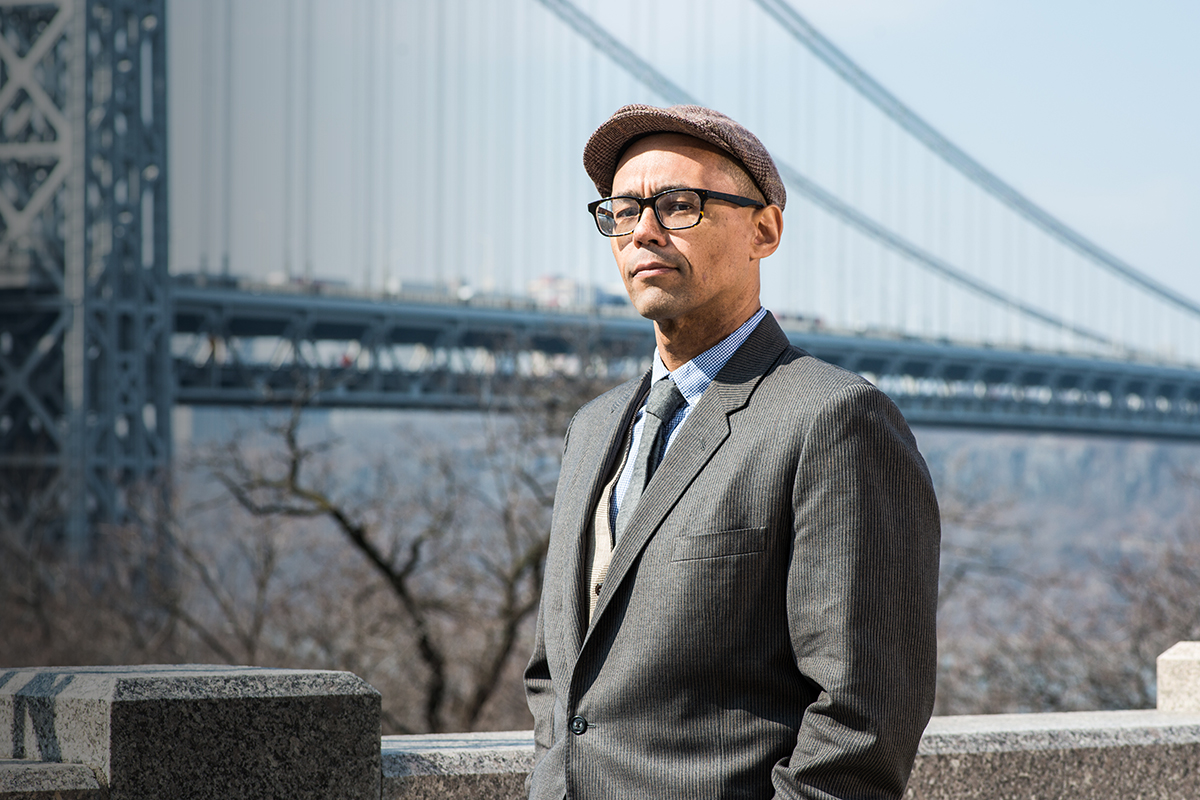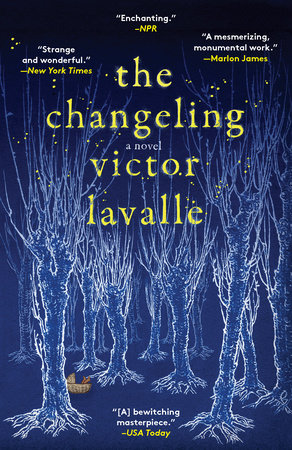Widening the Horror Genre: A Conversation with Victor LaValle
Andrew Boryga

On my lap was Victor’s latest novel, The Changeling, published in 2017 and recently named a finalist for the PEN/Jean Stein Award. The novel’s protagonist is Apollo Kagwa, a used book dealer whose own father disappeared when he was a child. Early on, the tone is cheerful. We meet Apollo and watch him fall in love and marry his charming wife, Emma. The two give birth to a son and settle into new lives as parents, the typical subsequent exhaustion and anxiety follow. But soon, Emma begins acting odd, suggesting signs of postpartum depression, until it becomes clear that her troubles are deeper. A horrific act separates Apollo from his wife and child and launches his quest to piece his life back together. The fable-like odyssey takes him to a forgotten island on New York, a graveyard full of secrets, and a forest inhabited by immigrant legends.
The Changeling is the sort of captivating and thrilling page-turner that fans of LaValle’s previous work, which includes three previous novels, a novella, and a short story collection, should expect. Woven throughout are narrative threads exploring parenting, technology, marriage and race that, when tied together, result in something special. Victor and I spent our time together discussing the novel and the impetus for everything happening in its pages.
Andrew Boryga: The Changeling concerns, at its heart, parenthood. In particular, new parenthood. You mentioned your father wasn’t really in the picture for most of your life. I’m sure that factored into your thoughts and anxieties about becoming a father, I know it has for me. I’m curious, what came first? Were you grappling with questions about being a dad for a while and it sort of bled into the writing? Or did the writing come first?
Victor LaValle: I spent most of my life, even when I didn’t realize it, grappling with being fatherless. But once our first child was born, my son, I realized that even though I was an older parent (I was 38 or 39) I was still that young man who’d been abandoned by his dad. I realized how ill-equipped I was for my kid because I was so in my head about my own hurts. But what I knew was that if I spent my life stuck in the past, my kid would not have a father either. My body would be in the room, but he wouldn’t really have a father. And I didn’t want to do that to him. So it’s not like I solved everything—I’m still dealing with it. But it was more like me realizing, oh, this is what matters to me right now and I’m consumed by it because I want to do right by this child. I want to do right by my wife. But I don’t feel equipped to do it. So what does that mean?
I knew that if I was wrestling with this, many of my friends, male and female, who were fatherless—even if their father was in the house—must be wrestling with it, too. I thought, this is something rich and powerful. I also thought this kind of fiction is not always the path men take. So I decided to dive deep into this, whatever we would call it… maybe, domestic fiction. Let me dive in head first, because I know this stuff is profound.
AB: In terms of the actual writing process, where did the idea for the characters and the plot start to germ?
 Victor LaValle
Victor LaValle
VL: The real world thing was that our son was born and he was a couple of days old. I snapped a picture of him on my phone and I immediately posted it on Facebook because I was so proud. Then 10 or 15 minutes passed and I logged back on because I wanted to see how many people had liked it. Then a half hour after that I said to myself, “What did I just do?” At the time I had a few thousand people I was “friends” with on Facebook. But the truth is I’m friends with maybe 40 of them. So I gave a couple thousand other people access to my son who I claim to want to protect. It’s not literally like I left him out on the street, but its also not that far off.
That idea started to play with my mind and I was thinking, well, what if among my friends there is one predatory man. I was imagining how, during the course of my son’s life, I’d be posting pictures of what park we go to, what schools he goes to, where his playdates take place, etc. What if there is a person out in the world monitoring that because he wants to snatch my kid? I started extrapolating things into levels of horror that frightened me. I thought, if this frightens me, it has to frighten other people.
AB: Speaking of horror, my first introduction to your work was your short story collection, Slap Boxing with Jesus. The language was very New York and the young people and scenarios you described felt very familiar and real to someone who grew up there. Your second novel followed a similar vein, but from there you transitioned into horror. How did that happen?
VL: One of the reasons I made the more conscious shift into horror was that I wrote my first two books and I was miserable writing them. And if they were making me rich and I was miserable, I could have lived with it. But I was miserable and I was only making a living. So, I asked myself, for the next 50 years do you want to be just only mining the bad stuff? I knew I did not. So at a certain point, I said, “What would you like to put into a book that would make you happy?” And the answer was monsters. I realize now that what I was really doing was trying to plug back into the 13-year-old me who just loved books and loved reading. That kid was not thinking, I want to make enough money so I can buy a town house. Or, I really hope I get on the cover of the New York Times Book Review. All he thought was, I can’t believe what this book is doing to me. How do I do this, too?
The shift was really about falling back in love with writing and storytelling. I’ve sort of started with literal monsters, but the next thing I’m working on are more human monsters. All of it is tapping into what made that kid version of me write. Now, I feel like as long as the kid version of me would be excited to read my work, then I am doing something right. And if the adult version of me can still find it compelling and thoughtful, then I am set.
That said, I’ve learned that using the term “horror” brings up certain associations for people. Also that people tend to exclude books from the genre. Like, Toni Morrison’s Beloved is a ghost story. Half of everything Faulkner wrote are ghost stories. But because they are not labeled that, people’s defenses go up when you point it out. So, I have a conflicted feeling about labeling my stuff horror. But at the same time, the 13 year-old me would be angry if I were embarrassed to call it horror.
AB: What writers blew away the 13 year-old version of yourself?
 The Cover of the Changeling
The Cover of the Changeling
VL: Stephen King, Clive Barker, Shirley Jackson, H.P. Lovecraft, Peter Straub. One of the reasons I lean into calling my work horror is because one thing I didn’t have when I was 13 is people of color I knew of writing in the genre. I realize there were all these things I internalized because of that. For instance, when I started writing horror at that age, I never wrote any people of color. The characters were always white people. And it was because in the books I read, the characters were always white. It was only later I said, “That’s ridiculous, number one. And number two, it would be a shame to not be able to use my own life in my work.” To be honest, I don’t know if a 13-year-old wants to read about parenting, but maybe someone else might pick up my book and say, “Oh, okay, I can do this too. There is room for this.” Maybe twenty or thirty years from now someone might say, “The first horror book I picked up was Victor Lavalle’s Devil in Silver. I would say I did alright then.
AB: I read that The Changeling was picked up for a TV series. That must be exciting. Can you talk about what role you will play in the project?
VL: For that one I am purely an Executive Producer. In the contract it says I get to write one episode per season. The company who bought the rights is really good and have produced a bunch of great movies. The woman who is the head of the TV department was the president at HBO for a number of years and helped bring Game of Thrones on air. She has an eye for quality and entertainment that makes me have a great deal of faith. My role is more of a consultant. But the other reason why I have a smaller role is because I put out a novella in 2016 called The Ballad of Black Tom, and that was bought to be developed into a series by AMC. I’m writing that one. Or at least I’ve written the pilot. The way they want to do it is sort of different than how most TV writing works. They don’t write the pilot and shoot it, they want to get the pilot right and then write the whole season before shooting anything. It’s a longer process, but my hope is that it will come out and we’ll get a whole season of a show I helped create in a hands-on way. I would be out of my mind happy if that happened.
AB: I know it is still early on, but can you talk a little about what it will be about?
VL: It takes place in the 1920s in Harlem. I don’t know of any black horror shows in Harlem in the 1920s, but Harlem then was such an interesting place. Not because of all the black folk there, but also all the people immigrating in from the Caribbean who were bringing their own flavors. And then there was also a big Chinese population in New York City at the time that were being prosecuted by the Chinese Exclusion Act that can be woven in. So not only will we be able to have characters of color in a horror plot, we’ll also have the chance to think about American history and what was happening at the time. Slipping that it in under the guise of entertainment is a way to get people to wrestle with things. I’m really daydreaming about people who come to the show for the horror and then it’s like, great, do you know what was done to six different islands of people from the Caribbean when they got to this country? We should talk about that.
AB: Speaking of New York City, it figures heavily in most of your work. Specifically Queens. But in this novel, I noticed you deal with your characters navigating a city rapidly gentrifying and changing around them. Also how they come to grips with those changes and their role in it. How did you handle that as someone who grew up in New York when it was a much different place?
VL: I feel like right now, New York is sort of rehashing the New York I knew in the early 80s. In terms of the kind of money flowing in and the small pockets of wealth vs. the neighborhoods wrestling with what that wealth is doing to them. But as a writer, I’m also trying to navigate where my wife and I figure into that. We moved to Washington Heights and we are not originally from that neighborhood. In a lot of ways, we are also part of the problem. So I am thinking about things like gentrification, but also not glossing over my own role in it. Like, we pat ourselves on the back for sending our kid to public school, but maybe we took a spot from a kid in the neighborhood?
The biggest danger I think, is staying stuck in the kid I was, the working class kid from Queens, the son of an immigrant single mom. There is something very flattering about staying that kid and forgetting that afterwards, I went to Cornell, I got a degree from Columbia, and now I teach at Columbia. I’m not quite that Queens kid alone anymore. You can’t write from and only hold on to that powerlessness. You’re going to have to start wrestling with your own power if you want to be honest. And I think that sometimes complicates things more than people want them complicated.
AB: You mentioned teaching at Columbia. I’m curious, as an MFA student myself, what are some of the common issues you see in young writers? How do you try and steer them away from them in the classroom?
VL: There are two things that are the most common blind spots. The first one is, maybe 97 percent of the stories have no antagonist. Meaning a person who is not a villain, but a person who is pushing back against the needs of the main character. There might people who in some small way call the protagonist a jerk or something, but there is rarely a person who has a competing, reasonable goal that the main character has to butt up against. The only way you show a person come to a revelation or a change or a growth, is because they come up against something that is formidable enough to force them to change. But if all they face is people who love them and are nice and help, or people who say they are a jerk but then walk off and don’t hold them accountable, how can they change? That’s the biggest one.
The second one is, all the characters are doing in the present, is sitting and thinking or sitting and talking, standing and thinking or standing and talking. This one comes up because most writers, when they sit to write, sit and write. It seeps in. Also, most writers, our natural state is to observe, rather than do. It’s natural for us to write characters who are observers. As a result you tend to have this inert character with no antagonist, who is just noodling around for twenty pages. What I always make my students do is write all the things the main character in their story actually does in the present. And almost without fail it is walk, talk to a friend, talk on the phone, wait at the bus stop. Then I ask the writer what they thought was happening in the story. And they may say, “Well, this person was supposed to be grappling with the fact that their mother might have to start chemo again to deal with her cancer.” But none of that is on the page. They are missing some kind of action in the present that shows the external manifestation of that internal problem.
So for a whole day, I’ll make them step-by-step write down everything they do: go to the store; go to the doctor; pick up medication; do laundry. Then the next step is to read the list out loud to the class. It might very well be that it was a boring day. But they still went places and there is a story of their day in that list. Usually, that helps to teach them how much present action means and how much it does for a story.
AB: I’ll have to use that exercise myself. So, last question, the one all writers love: What’s next?
VL: The next thing is going to be three novellas that come out individually, once a year. It is the story of the women in this one family during three different time periods and how they all wrestle with this one man or the spirit of this one man. The first is a western, the second is a mystery, and the third is sort of an adventure story. The first one takes place around 1905 in Montana, just after the Homestead Act. Then the middle one takes place in the 1980s during the horror movie boom and the last one during Hurricane Sandy. But the narrator is the woman in the last book and she is basically telling you the story of the resilience of the women in her family. The idea is that each one is a standalone story that is interesting. Then after they all come out, we will put the book together and readers will say, “Oh, I gotcha now.” That will hopefully be interesting and a fun way to tell stories across time and generations. We’ll see how it goes. I’m very excited about it. And it will get me out of New York for a change.
Andrew Boryga is a writer based in South Florida. His work has been featured in The New Yorker, The New York Times, The Atlantic and other outlets. He is a Michener Fellow in the University of Miami’s MFA program.









